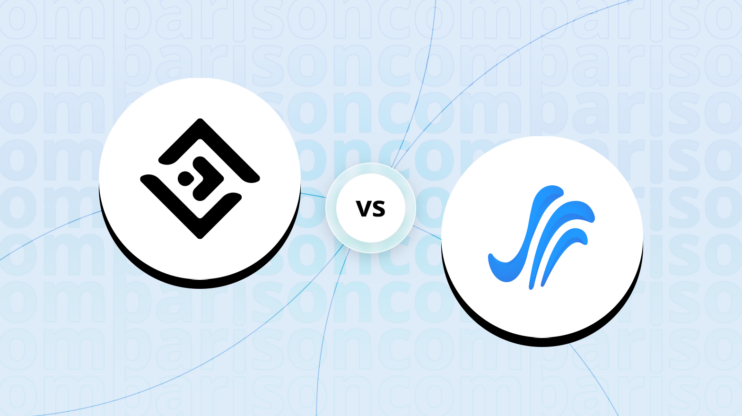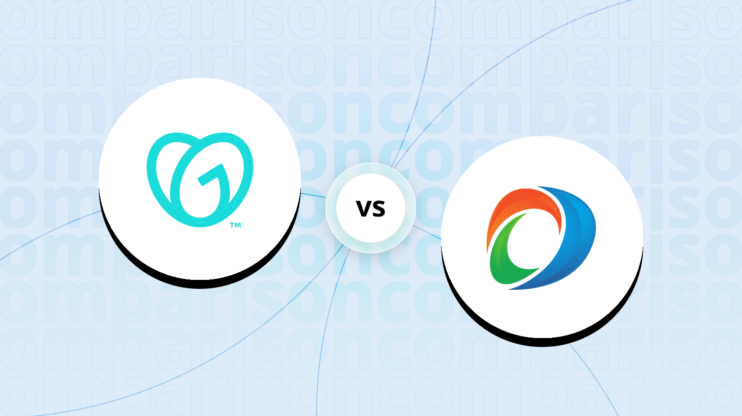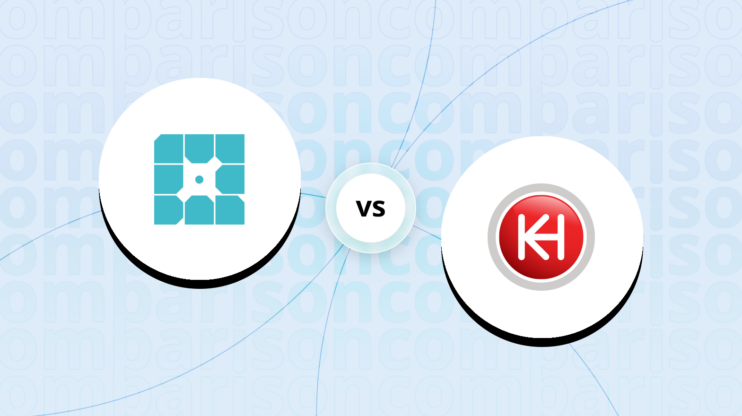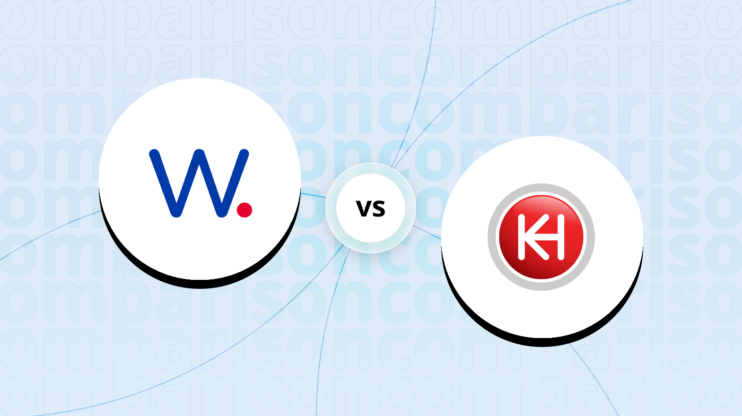Godaddy vs Hostpro: Final verdict
Comparing GoDaddy and HostPro, it’s evident that both providers have unique strengths.
GoDaddy (Overall grade: 7.8)
is known for its comprehensive variety of hosting plans, exceptional uptime, and rapid server response times, making it a strong choice for a wide range of users including WordPress and eCommerce sites. It offers AI-powered website builders, daily backups, free SSL, and other robust features designed to enhance the user experience. Its global data centers ensure minimal downtime and faster load speeds. However, some users are put off by high renewal costs and occasional downtime on WordPress plans. Despite these issues, its extensive support options and user-friendly interface make it a reliable option for casual bloggers and small to medium-sized business owners.
HostPro (Overall grade: 6.9)
focuses on high-performance hosting with NVMe SSDs and superior computational power using Intel® Xeon® processors. This makes it ideal for high-traffic and multimedia websites. HostPro also excels in offering advanced security features like Imunify AV+ for malware removal and Cloudflare integration for enhanced site performance. While it provides a more technical and affordable hosting experience, the lack of some user-friendly tools and services, such as a built-in AI-powered website builder, can be a drawback. Additionally, although it lacks phone and live chat support, its robust 24/7 email support and detailed knowledge base are beneficial for technical users.
 Overall grade:7.8 |
 Overall grade:6.9 |
|
|---|---|---|
| Uptime and Availability | 8.6 | 6.8 |
| Hosting Performance | 8.1 | 8.5 |
| Hosting Security | 8.6 | 9.0 |
| Price | 7.7 | 8.8 |
| Hosting Features | 7.1 | 5.5 |
| Ease Of Setup | 8.7 | 8.8 |
| User Management | 5.0 | 0.0 |
| Customer Support | 8.2 | 7.9 |
| User feedback | 3.9/5 | 5/5 |
Hosting types offered
Both platforms provide a variety of hosting types, each designed to meet the different needs of users.
 |
 |
|
|---|---|---|
| Shared hosting | ||
| Cloud hosting | ||
| WordPress hosting | ||
| Ecommerce hosting | ||
| VPS hosting | ||
| Dedicated hosting |
Although both offer a variety of hosting plans tailored to different needs, in certain cases, one platform may prove to be more suitable.
Detailed comparison
Uptime and availability
Evaluates the average uptime statistics, uptime guarantee and overall availability of the hosting
provider
Score Components:
- Uptime percentage (30%): evaluates the uptime statistics in given period of time
- Uptime guarantee (20%): Assesses if the platform offers an uptime guarantee and
whether the actual uptime matches the promised guarantee. - General performance (25%): Evaluates how fast is the average response time and overall
it’s stability. - Responsiveness (10%): Adaptability to different devices and screen sizes.
- Availability (25%): Reflects the total downtime and number of outages.
 8.6
8.6
 6.8
6.8
🏆 Winner GoDaddy: With excellent uptime and fast server response times, GoDaddy stands out among hosting providers.

GoDaddy offers a 99.9% uptime guarantee and consistently performs above this benchmark, achieving a 99.98% uptime rate during testing. The average server response time of 341ms significantly outperforms the industry average for shared hosting, which usually hovers around 600ms. This performance is reflected globally, with load times keeping the Largest Contentful Paint (LCP) metric well below 2.5 seconds. Occasional downtimes were recorded, especially with WordPress hosting plans, but these were typically of short duration.

HostPro, while also claiming a 99.9% uptime guarantee, fell short in actual performance with a 99.43% uptime rate during testing. Despite speed performance scoring relatively well with load times between 2.3 and 2.9 seconds, it couldn’t match GoDaddy’s overall reliability and uptime. HostPro’s data centers across multiple locations and use of NVMe SSDs bolster its service offerings, but GoDaddy’s performance metrics and efficiency put it ahead in this comparison.
Which one has better hosting performance?
Score Components:
- Hosting speed (30%): This includes SSD quality, Load times, PageSpeed score ranges,
additional information on website speed, built-in plugins for performance enhancement, available caching
methods, and CPU/RAM options - CDN (20%): Considers whether CDN is available or not, whether it’s free or paid, and
the quality of the CDN service - Available data centers (30%): Evaluates the number of data centers and their locations
globally. - Scalibility (20%): Looks at whether elastic scaling is available, the process required
to scale (manual upgrade vs. automatic scaling), the presence of dedicated servers, and the costs
associated with scaling.
 8.1
8.1
 8.5
8.5
🏆 Winner
HostPro: Advanced Performance and Security for Seamless Hosting
When comparing GoDaddy and HostPro, we see significant differences in performance features. GoDaddy offers optimized servers with a 40% faster response time, and multiple global data centers in North America, Europe, and Asia-Pacific to ensure minimal downtime and faster load speeds. HostPro, on the other hand, utilizes NVMe SSDs which are 10x faster than traditional SSDs and employs Intel® Xeon® processors for handling high workloads. Additionally, HostPro features the LiteSpeed Web Server with built-in Cache plugin for page optimization, and Cloudflare integration for improved speed and security. GoDaddy provides 1-click WordPress installs and 150+ free applications, while HostPro offers similar functionalities but places a heavier emphasis on speed and security enhancements.
Website Speed
Both GoDaddy and HostPro provide reliable and fast hosting solutions, but HostPro pulls ahead with its NVMe SSD technology, achieving page load times within less than a second. HostPro’s combination of LiteSpeed Web Server and Cloudflare integration further enhances website performance. Conversely, GoDaddy’s servers achieve up to 40% faster response times with a global network of data centers. Despite GoDaddy’s impressive speed and reliability, HostPro’s use of superior SSDs and high-performing processors results in even quicker page loads and smoother user experiences.
Scalability
Scalability is a crucial factor for growing websites. GoDaddy offers various plans with unmetered bandwidth and options for dedicated resources in higher-tier plans. Scaling typically involves upgrading to a more advanced plan manually. HostPro, however, does not specify whether their scaling happens automatically or requires plan upgrades. Both services offer dedicated servers, but only GoDaddy provides detailed pricing for these options. Without insights into HostPro’s costs or scaling methods, GoDaddy’s transparent and detailed approach gives it an edge in scaling flexibility.
Which one has better security features?
and regulatory requirements
Score Components:
- Technical security measures (40%): This includes encryption, firewalls, DDoS
protection, secure configurations, server monitoring, access control and availability of security addons
(e.g Sitelock security). - Operational security measures (30%): Encompasses data privacy, backups and data
redundancy. - Compliance and certifications (20%): Adherence to legal and regulatory requirements
(e.g., GDPR, HIPAA) and possession of certifications (e.g., ISO 27001, SOC 2). - Business and reliability (10%): Factors in the provider’s reputation, uptime
guarantees, and customer support.
 8.6
8.6
 9.0
9.0
🏆 Winner HostPro: Offers superior security measures and compliance features for enhanced hosting reliability.
Technical security measures:
GoDaddy provides a suite of technical security measures that include AutoSSL, various managed and self-managed SSL certificates, PHP versions 7.4 and 8.0 with extended support, and CloudLinux for balanced resource allocation. In comparison, HostPro offers free SSL certificates with automatic renewal, support for multiple PHP versions from 4.4 to 8.0, and advanced tools like Imunify AV+ for malware removal and firewall management. HostPro excels with additional features such as daily backups stored for 30 days, secure SSH access, and custom firewalls.
Operational security measures:
Both GoDaddy and HostPro support PCI compliance and provide robust DDoS protection. GoDaddy features include network security, 24/7 customer support, and automated updates for various website elements. HostPro stands out with anti-virus and anti-spam protection, vulnerability scanning, and event log management. Additionally, HostPro includes password-protected directories, a secure webmail interface, and FTP access options, making its operational security more comprehensive.
Compliance and certifications:
GoDaddy and HostPro are both GDPR-compliant, offering transparency in data handling and user privacy. GoDaddy provides specific training for all staff on data protection. Both companies also ensure their products are PCI-compliant. HIPAA compliance is not specified for either provider.
 |
 |
|
|---|---|---|
SSL certificate |
Managed and self-managed SSL |
Free SSL certificates, auto renewal |
Additional security features |
Malware scanning, DDoS protection |
Imunify AV+, Firewall, SSH access |
PHP versions |
Latest PHP versions 7.4, 8.0 |
PHP 4.4, 5.1-5.6, 7.0-8.0 |
GDPR compliance |
Yes |
Yes |
HIPAA compliance |
Not specified |
Not specified |
PCI compliance |
Yes |
Yes |
Hosting features
Score Components:
- Domains (20%): Assesses the availability of a free domain, domain purchase options, and
pricing - Email (15%): Considers if the provider offers full email hosting, or is reselling
third-party service, and if the email is only transactional or not - Website builder (15%): Checks if website builder is available, and it’s user
friendliness and overall the level of customization allowed. - Staging environment (20%): Determines if a staging environment is available, allowing
for testing changes before going live. - FTP & SFTP accounts (10%): Evaluates if and how easily users can access FTP and
SFTP accounts - Git and SSH access (20%): Assess whether Git is integrated into the hosting service and
if SSH access is provided
 7.1
7.1
 5.5
5.5
🏆 Winner: GoDaddy: A reliable and feature-packed hosting solution suitable for various needs.
Both GoDaddy and HostPro stand out in the hosting market with their unique offerings, yet GoDaddy emerges as the preferable choice for those seeking more comprehensive hosting solutions. GoDaddy provides various web hosting plans tailored to different performance levels, such as Standard, Deluxe, Ultimate, and Maximum Performance, making it appealing to a range of users from casual bloggers to business owners needing robust resources. Additionally, GoDaddy excels in Managed WordPress Hosting and VPS Hosting options, all coming with user-friendly features like free domains, SSL certificates, and a variety of free email services. Notably, GoDaddy includes sales-focused tools like WooCommerce hosting and offers efficient customer support through multiple channels, which is essential for users who prioritize reliability and security. In contrast, HostPro provides robust support with cPanel, advanced storage options like NVMe SSDs, and a variety of database management tools, but lacks some of the additional freebies and customer-centric extras GoDaddy offers, such as the money-back guarantee and extensive global data centers for enhanced speed.
One significant differentiation is the availability and user-friendliness of website builders. GoDaddy offers an AI-powered creation tool, streamlining the website building process even for beginners while offering complex customization for tech-savvy users. This transforms the user experience, enabling easy setup and maintenance without in-depth technical skills. HostPro, while powerful with its cPanel and extensive scripting languages, doesn’t highlight a specific website builder, potentially presenting a steeper learning curve for those without coding knowledge. Moreover, GoDaddy’s plans often include free domain registration and SSL certificates for the first year, adding notable value, especially for startups and small business owners looking to keep upfront costs manageable. HostPro’s offering of unlimited email accounts and a staging environment shows how it can fit well within a development or tech-savvy community. Still, compared to GoDaddy’s broader service range, HostPro might require additional external solutions, which could influence the overall decision for many customers.
 |
 |
|
|---|---|---|
Free domain |
Yes, 1 year |
No |
Free SSL |
Yes, 1 year |
Yes |
Email hosting |
Yes |
Yes |
Website builder |
Yes (AI-powered) |
No |
Staging environment |
Yes (in higher plans) |
Yes |
FTP & SFTP accounts |
Yes |
Yes |
Git and SSH access |
Yes |
Yes |
Free backup |
Yes (Daily) |
Yes (Daily) |
Money back guarantee |
Yes, 30 days |
No |
a location.
As a result in rare cases the features mentioned here can differ from the ones you see on their websites.
Both providers support a range of users from beginners to experts with user-friendly website builders and WordPress staging areas. However, in terms of developer tools, both GoDaddy and HostPro offer robust options including SSH access, support for multiple programming languages, and Git for version control, thus appealing to developers looking for advanced capabilities.
Email services:
GoDaddy provides comprehensive email hosting services, offering free email accounts with all its hosting plans, making it easy for users to manage and set up their email campaigns. Their email solutions include security features and spam filters. HostPro also offers unlimited email accounts with excellent support for popular email protocols and a secure webmail interface. Both providers ensure reliable email hosting capabilities, but GoDaddy’s all-inclusive initial setup with free services for the first year stands out significantly. While neither focus explicitly on transactional email capabilities or reselling third-party email services, they both support robust email management suited to small to medium-sized enterprises.
Price
Score Components:
- Plan value (40%): What each pricing tier offers.
- Transparency and clarity (30%): Clearness of pricing structures.
- Flexibility of plans (20%): Range of options to suit different budgets.
- Hidden costs (10%): Additional expenses not included in the plan.
 7.7
7.7
 8.8
8.8
🏆 Winner HostPro:Offers affordable and scalable hosting plans suitable for a variety of needs.
Evaluating the pricing of plans among various hosting providers can be complex due to their differing pricing and renewal strategies. Additionally, certain plans require annual commitments, which adds to the difficulty of making comparisons. The prices listed are based on monthly commitments; plans requiring annual commitments are indicated. Additionally, although some providers offer identical plans for WordPress and shared hosting, we have created separate tables for each to enhance clarity.
GoDaddy and HostPro both provide a diverse range of plans spanning web hosting, WordPress hosting, and cloud hosting. While GoDaddy’s plans tend to be more expensive and catered to users needing extensive resources or premium features like unlimited SSL certificates and priority support, HostPro shines with its affordability and simplicity, especially in the shared and managed web hosting categories. HostPro’s standout feature lies in its balanced offerings, making it a cost-effective choice without sacrificing performance.
 |
 |
|---|---|
|
Managed WordPress Basic$12.99
1 website, 10 GB NVMe storage, free domain, free SSL certificate, WordPress pre-installed, AI creation tool, weekly backups. Value for price:7.5
|
Start Plan$4.95
5 websites, 20 GB NVMe SSD, cPanel included. Value for price:8.5
|
|
Managed WordPress Deluxe$13.99
1 website, 20 GB NVMe storage, free domain, free SSL certificate, WordPress pre-installed, AI creation tool, daily backups, CDN. Value for price:7.7
|
Pro Plan$6.95
15 websites, 30 GB NVMe SSD, cPanel included. Value for price:8.8
|
|
Managed WordPress Ultimate$15.99
1 website, 30 GB NVMe storage, free domain, free SSL certificate, WordPress pre-installed, AI creation tool, daily + on-demand backups, CDN, SEO optimizer, WooCommerce support. Value for price:7.8
|
Business Plan$7.95
30 websites, 60 GB NVMe SSD, cPanel included. Value for price:8.6
|
 |
 |
|---|---|
|
Web Hosting Economy$5.99
1 website, 25 GB NVMe storage, free domain, free email, free SSL (1 year). Value for price:7.0
|
Simple Plan$3.95
2 websites, 10 GB NVMe SSD, DirectAdmin or cPanel. Value for price:8.2
|
|
Web Hosting Deluxe$7.99
10 websites, 50 GB NVMe storage, free domain, free email, free unlimited SSL. Value for price:7.3
|
Strong Plan$6.95
15 websites, 20 GB NVMe SSD, DirectAdmin or cPanel. Value for price:8.4
|
|
Web Hosting Ultimate$12.99
25 websites, 75 GB NVMe storage, free domain, free email, free unlimited SSL. Value for price:7.5
|
Powerful Plan$7.95
25 websites, 30 GB NVMe SSD, DirectAdmin or cPanel. Value for price:8.6
|
|
Web Hosting Maximum$17.99
50 websites, 100 GB NVMe storage, free domain, free email, free unlimited SSL. Value for price:7.8
|
N/A |
 |
 |
|---|---|
| N/A |
1 GB Plan$10.00
1 GB RAM, 1 CPU, 25 GB NVMe SSD, 1 TB Bandwidth. Value for price:8.0
|
| N/A |
2 GB Plan$20.00
2 GB RAM, 1 CPU, 50 GB NVMe SSD, 2 TB Bandwidth. Value for price:8.3
|
| N/A |
4 GB Plan$40.00
4 GB RAM, 2 CPU, 80 GB NVMe SSD, 4 TB Bandwidth. Value for price:8.0
|
| N/A |
8 GB Plan$70.00
8 GB RAM, 4 CPU, 160 GB NVMe SSD, 5 TB Bandwidth. Value for price:7.5
|
| N/A |
16 GB Plan$125.00
16 GB RAM, 6 CPU, 320 GB Storage, 6 TB Bandwidth. Value for price:7.0
|
| N/A |
32 GB Plan$220.00
32 GB RAM, 8 CPU, 640 GB Storage, 7 TB Bandwidth. Value for price:7.0
|
| N/A |
64 GB Plan$395.00
64 GB RAM, 16 CPU, 1280 GB Storage, 9 TB Bandwidth. Value for price:6.5
|
Enterprise plans
GoDaddy provides extensive resources for businesses needing up to 50 websites, with plans offering up to 100 GB NVMe storage and high security standards. On the other hand, HostPro’s enterprise-level offerings include robust cloud hosting and VPS plans with scalable RAM, CPUs, and storage options, making it a more versatile choice for growing enterprises. With its balanced pricing and extensive features, HostPro emerges as the preferred option for businesses seeking both economy and scalability.
Godaddy vs Hostpro: Ease of setup
platform.
Score Components:
- Site migration (25%): Assesses whether the provider offers tools for site migration,
either automated or manual, and whether these services are free or require a fee. - Admin panel usability (35%): Evaluates the type of admin panel provided, such as the
standard cPanel or a custom solution, focusing on its accessibility and user-friendliness for both
technical and non-technical users. - Setup features (20%): Examines the availability and ease of use of various setup
features, including FTP accounts, file managers, email account setup, PHPMyAdmin, and easy CDN
configuration. - Help center quality (20%): Measures the quality and accessibility of the provider’s
help center resources, including articles and tutorials.
 8.7
8.7
 8.8
8.8
🏆 Winner
HostPro: A user-friendly setup process and a detailed knowledge base make HostPro a great choice for website hosting.
GoDaddy and HostPro both offer the industry-standard cPanel for managing your hosting environment. GoDaddy’s control panel is noted for its ease of use, providing a seamless experience even for users who may not be technically inclined. This interface supports one-click setup for various applications, which can be particularly beneficial for beginners. HostPro also leverages cPanel but pairs it with Softaculous for an even larger selection of applications. This combination offers an intuitive interface for both technical users and newcomers, facilitating tasks like database management and email account setup without needing any technical expertise.
When considering the overall ease of navigating these panels, both providers excel, but HostPro’s inclusion of the Softaculous script library adds an extra layer of convenience. The graphical interface of cPanel is user-friendly and helps streamline complex tasks. GoDaddy’s control panel is powerful and straightforward, allowing users to manage backups, security, and applications with minimal effort. HostPro, on the other hand, provides a slightly more enriched experience through its extensive application support and free SSL certificates, making it not only accessible but also feature-rich.

Both providers offer robust migration tools, but their approaches differ. GoDaddy has a free WordPress migration tool that automates the process, making it extremely convenient for WordPress site owners to transfer their websites effortlessly. HostPro, however, provides free manual site migrations. This service is beneficial for those who prefer human oversight during the migration process or need to transfer non-WordPress websites. While automated tools like GoDaddy’s can be quick and efficient, HostPro’s manual migrations offer a personal touch, which some users may find more reassuring.
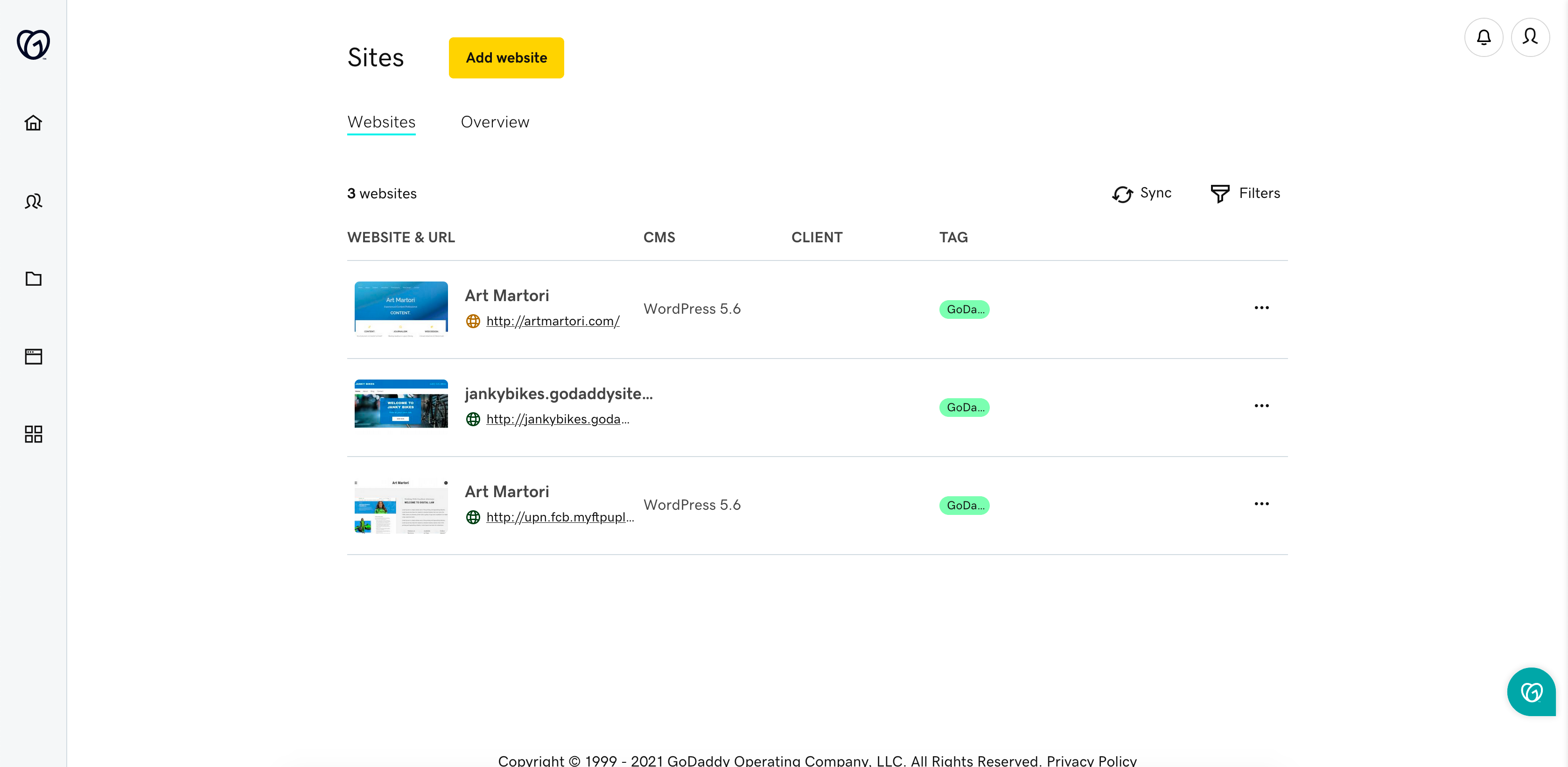
Both providers offer extensive help center resources that are easily accessible. GoDaddy features 24/7 customer support through phone and chat, a comprehensive FAQ section, and a range of help articles covering different aspects of web hosting. HostPro also boasts a detailed knowledge base, including categories like SSL, VPS, and security, alongside technical support via email and an affiliate program support team available on weekdays. Users can find a wealth of information and assistance on all aspects of their hosting needs through these resources.
The platforms provide extensive knowledge bases filled with guides, how-to articles, and instructional content. GoDaddy offers a wide range of resources alongside 24/7 chat and phone support. HostPro also boasts a detailed help center with an intuitive search function and around-the-clock support via live chat, phone, and ticketing, ensuring comprehensive user support.
User management
accessibility.
Score Components:
- Role customization (40%): Flexibility in creating and defining user roles and
permissions. - Ease of management (30%): User interface and tools for managing users.
- Access control (20%): Effectiveness of access control measures for different user
levels. - Scalability (10%): Ability to manage a growing number of users efficiently.
 5.0
5.0
 0
0
🏆 Winner: GoDaddy: Offers more user management features compared to its competitor.
When comparing GoDaddy and HostPro in managing user roles, permissions, and accessibility, GoDaddy takes the lead due to its extensive user management features. GoDaddy allows administrators to create and define various user roles with specific permissions, making it easier to manage different levels of access. HostPro, on the other hand, does not provide detailed information on its user management capabilities, making it challenging to ascertain its flexibility and effectiveness in this area.
Both platforms present user interfaces aimed at simplifying user management, but GoDaddy’s tools stand out. It provides a more intuitive dashboard, granting administrators straightforward access to user roles and permissions settings. HostPro’s user interface lacks detailed information, potentially making it more cumbersome for admins to manage users efficiently and effectively compared to GoDaddy.
In terms of access control measures and managing a growing number of users, GoDaddy demonstrates an effective system with scalable solutions. Its access control features allow administrators to easily delineate user privileges, making it adaptable to increasing user numbers. The lack of detailed information about HostPro hinders a clear picture of its scalability and access control measures, potentially affecting its ability to manage a growing user base competently.
GoDaddy User Roles Table:
| Role | Description | Access Highlights |
|---|---|---|
| Administrator | Full control over all aspects of the hosting account. | Can add/remove users, change settings, and access billing info. |
| Editor | Manage content and modifications without administrative powers. | Edit content, but cannot change settings or access billing info. |
| Viewer | View content without editing or administrative privileges. | Read-only access to content and settings. |
Customer support
hosting provider.
Score Components:
- Support communication channels (30%): Measures the variety of customer support types
provided (live chat, chatbot, email, phone, etc.) - Availability (20%): Assesses the availability hours for each channel, including 24/7
support options. - Technical support quality (30%): Assesses whether the provider offers comprehensive
technical support, including hardware upgrades (e.g., HDD to SSD), software installations, and web
server configuration changes. - Enterprise support (20%): Checks if there are dedicated or priority support services
for enterprise-level customers.
 8.2
8.2
 7.9
7.9
🏆 Winner: GoDaddy: Known for offering 24/7 support and a vast knowledgebase, GoDaddy stands out in customer service.
 |
 |
|
|---|---|---|
| Phone support | ||
| Live chat support | ||
| Chatbot | ||
| Email/ticket support | ||
| Enterprise support (dedicated agent, priority support) |

GoDaddy provides a comprehensive range of support options, including 24/7 phone support, live chat predominantly for US-based customers, and an extensive knowledgebase with various resources like blog articles and online courses. They also offer additional perks such as automatic daily backups and a 30-day money-back guarantee, making them a compelling option for many users.

HostPro, although offering 24/7 email and text support, lacks in areas like phone and live chat support. They make up for it with specialized technical, performance, and security services, including free manual site migrations and a 30-day money-back guarantee. HostPro also provides free SSL certificates and supports a wide range of technologies, making it a robust option for technically inclined users seeking specific performance enhancements.
Godaddy vs Hostpro: User feedback
User feedback for this hosting provider is mixed but generally leans towards a positive experience, especially for those seeking a one-stop solution for domains and web hosting. Users appreciate the provider’s ease of use, feature-rich interface, and comprehensive customer service capabilities, although some reviews highlight inconsistent support experiences. While initial pricing and discounts are attractive, many users express frustration with high renewal costs and upselling tactics. Additionally, there are concerns about slow issue resolution times and the lack of free features available from other providers.
Users highly recommend HostPro for its excellent balance between performance and price, particularly praising its robust web hosting plans. The VPS service is highlighted for its impressive speed, thanks to blazing-fast SSD and NVMe storage, and powerful processors. The consistently responsive and customer-focused support team receives considerable commendation for their ability to resolve issues promptly. Overall, HostPro stands out for offering a combination of high-quality hardware, scalability, and exceptional customer service.
Godaddy vs Hostpro: FAQ
Which platform is better suited for hosting WordPress websites?
GoDaddy is better suited for hosting WordPress websites due to its AI-powered site builder, daily backups, free SSL, and additional features like a Web Application Firewall (WAF). It offers a more comprehensive and user-friendly experience for WordPress users compared to HostPro, which does not specifically offer WordPress hosting.
Which hosting service offers better security features?
Both GoDaddy and HostPro offer robust security features, but HostPro edges out with advanced tools like Imunify AV+ for malware removal, custom firewalls, and secure SSH access. HostPro also provides daily backups and free SSL certificates with automatic renewal, making it a more secure option.
Which platform offers better customer support?
GoDaddy offers better customer support with 24/7 phone and live chat support, along with a comprehensive knowledge base. HostPro, while providing 24/7 email support and a detailed knowledge base, lacks live chat and phone support options, making GoDaddy the winner in this category.
What are the major differences in pricing and value between GoDaddy and HostPro?
GoDaddy’s plans are generally more expensive and come with additional features like free domain registration and SSL for the first year. HostPro offers more affordable plans with robust features, especially for shared and managed hosting. GoDaddy tends to cater to users needing extensive resources, while HostPro shines with cost-effective solutions without sacrificing performance.
Which service is more suitable for hosting a high-traffic website?
HostPro is more suitable for hosting high-traffic websites due to its NVMe SSD-based servers and high-performance features such as LiteSpeed Web Server and Cloudflare integration. These elements ensure faster load times and better handling of high traffic compared to GoDaddy.
The making of this blog
We followed a clear, step-by-step process to write and research this article.









